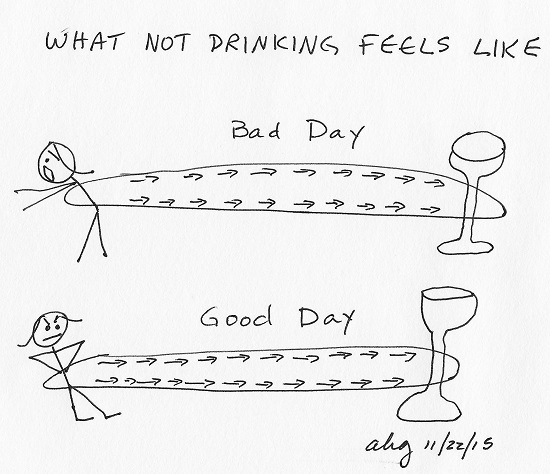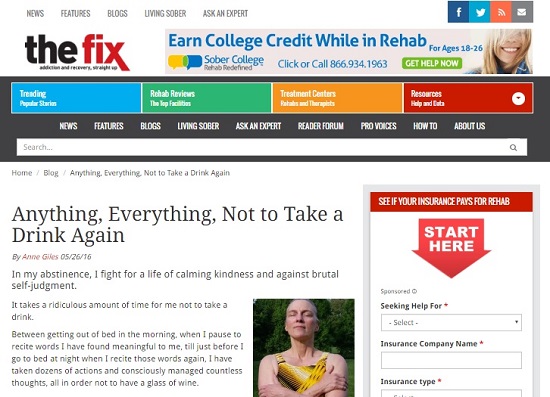I have been abstinent from alcohol for over 4 years. But I am no St. Anne of Recovery.
For me, abstinence is not a moral high ground. I get little from abstinence that I revere or value. I wish I were having glasses of wine with my friends and co-workers again.
My life is not better as a result of developing addiction to alcohol or being in remission from alcohol use disorder. I have nothing in common with rah-rah recovery community members who are “grateful” they developed addiction so they can receive “the promises” of recovery. I experienced professional, financial, relational, social, emotional and mental ruin as a result of developing alcoholism. If my family didn’t support me, my townspeople would have to begrudge me a share of their tax dollars allotted for social services agencies for the indigent. My income is so low, I qualify for subsidized health insurance. I live with an ever-present, mewling whine of parched, hungry, stifled needing-and-not-having. My return to alcohol use which, based on the numbers, is nearly inevitable, will not feel like a mistake to me, but mercy.
When I finished my training as an addictions counselor, prior to developing alcoholism myself, I believed the ladies at the women’s residential treatment center where I served my internship simply needed me, Miss White Bread Do-Gooder – moralistic as only the eldest child of two eldest children parents can be – to enlighten them about their decision-making.
According to my coursework during 2003-2006 for a master’s degree in counseling, addiction was a mental illness. “Alcoholics” and “addicts” simply didn’t understand themselves and how life worked. I could counsel them to recognize unconscious family-of-origin issues through psychodynamic therapy, correct their thoughts through cognitive behavior therapy, instruct them in how to replace their immorality with Kohlberg’s “universal ethical principles,” and lift them up from their “spiritual disease” with 12-step principles. Alcoholics and addicts would see the error of their ways and abstain. Then we would send them out to be productive members of society, Sneetches with “stars on thars,” their addictions arrested.
If the people with addictions weren’t ready enough to “change” in accordance with Prochaska’s and DiClemente’s transtheoretical model, well, we didn’t say this but we were thinking it: the addicts secretly wanted to keep diddling themselves with their substances. Tsk-tsk. I remember a nod being given to the possibility that maybe, maybe something else was going on with the term “dual diagnosis” (now termed co-occurring disorders ) but addictions treatment theory focused primarily on redemption of emotions, cognitions and behaviors. Simply put, the addict had to be better, think better, and do better to get better.
O, polite and patient ladies at the treatment center! I am so sorry. I just didn’t understand.
I can speak publicly about addiction because I have had no legal consequences from having developed the illness of addiction. Further, I have no partner, children or career. If I had to keep a judge pleased with me right now? Or a child protective services case worker? Or the parents of my children’s friends so the friends would still be allowed to play at my house? Or my boss, or my partner’s boss, so we can stay on track for a promotion? No way I’d utter a peep. I want to beat stigma with the imaginary length of 2″ x 4″ I keep in my prim purse. But it won’t help. Stigma is a behemoth.
So, what’s a person with addiction to do in 2017? Scrabble for as much evidence-based help as is available.
Then what?
For me, while the intensity waxes and wanes, even after 4 years of abstinence, my longing for a drink is ever-present. Addiction, for me, is 24-7. The Surgeon General’s report on addiction urges a 3-prong treatment approach, in priority order: medications and medical care, counseling, and “recovery support services,” RSS. I do all these and I appreciate them. I welcome help from people who don’t have this and I’ve tried to explain to them that it’s like this and this, but I come away thinking that they – as I did not – just don’t (or won’t) understand.
So when medications are doing what they do, but no more than that, and I’m not in a counseling session, or attending a support group meeting, then what? I’m all I’ve got.
Love, evidence & respect. https://t.co/KjWN2oKebR
— Maia Szalavitz (@maiasz) June 25, 2016
That’s why I wrote “3 Handouts I Wish I Had Been Given on My First 3 Days of Recovery from Addiction.” Here’s Handout 1. (I’ve compiled all 3 handouts as A Brief Guide to Evidence-Based Self-Care for Recovery from Addiction.)
I reflected on the past 4 years of abstinence, about which I publicly tried to be brave, but which were privately wretched (the research explains why), and wished better for myself. I studied Maia’s book and Vivek’s report and countless research articles and learned the difference between what we know is true in 2017 and what I believed was true in 2006. I imagined using Hermione Granger’s Time-Turner and traveling back in time to be of help to my newly abstinent self.
There I am, waking up on December 28, 2012, intent on that being the first day, forever, that I do not have a glass of wine at 5:00 PM, and then another and another until I’ve had a whole bottle and start falling down the stairs. Look how determined and resolute I am!
My poor self! I have no idea what’s in store for me: the meanness of withdrawal and unrelenting anhedonia; self-meanness from shame and humiliation at believing I am no longer myself, but am an “alcoholic,” a person who meant well but went bad anyway; meanness from the “tough love” recovery community; mean-feeling, arms-length treatment from the medical community; the meanness of mental illness, sedated by alcohol, awakening to scorch and twist me; the meanness of addiction itself that destroys the minds, hearts and lives of those I meet and come to love; the meanness of treatment professionals who say, “Addicts lie. That’s what they do”; the meanness of a society that can ask my friend of half a century, “How’s your alcoholic friend?” and post comments on the Internet like, “All alcoholics should be shot at dawn – and that goes for drug users as well.”
If I could go back in time, my 2017 self would give my 2012 self such a hug! “It’s not you, honey!” I would say. “It’s a brain condition! Nothing more, nothing less.” Then I would hold myself as I began to cry with such grief and regret.
“It’s going to be okay,” I would say. “Look, we don’t know much that directly treats the brain for addiction, but we do know some things that can help with abstinence – or with harm reduction if that’s the plan. You are such a serious, hard-working girl, but I know that you don’t feel well at all right now, so I’ve made you some simple handouts. They synthesize and distill what the research says might be helpful for you. I am so sorry you are suffering.” I would hug and hug my 2012 self. And my 2012 self might even laugh shakily a bit at feeling so loved and cared for, so seen, known and understood.
And my handouts are kind, not mean. And maybe that would have made all the difference.
. . . . .
The Fix publishes excerpts from my memoir-in-progress on Fridays. A table of contents is here.
The opinions expressed here are mine alone and do not necessarily reflect the positions of my employers, co-workers, family members or friends. This content is for informational purposes only and is not a substitute for medical or professional advice. Consult a qualified health care professional for personalized medical and professional advice.
Updated 5/6/17



